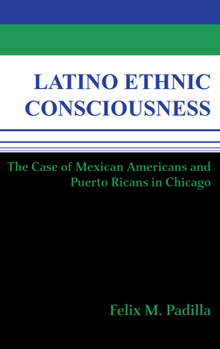Latino Ethnic Consciousness: The Case of Mexican Americans and Puerto Ricans in Chicago
Select Format
Select Condition 
Book Overview
Focusing on Mexican-American and Puerto Rican populations in Chicago, Latino Ethnic Consciousness documents the development of a collective Hispanic or Latino ethnic identity, distinct and separate from the national and cultural affiliations of Spanish-speaking groups. Author Felix Padilla explores the internal dynamics and external conditions, which have prompted this move past individual group boundaries to a broader ethnic identity.
According to Padilla, the Latino ethnic identity develops from the cultural and structural similarities of two or more Spanish-speaking groups and often in response to common experiences of social inequality. In that ethnic identities have to a large extent been encouraged by the division of the labor market in America's industrial society, he argues that the Latino consciousness represents a situational ethnic identity which functions according to the needs of the groups. He describes how such conditions as poverty and racial discrimination have necessitated the assertion of a broader Latino ethnic consciousness and behavior, often more successful in social action than individual cultural or national associations.
In case studies from the early 70s, Padilla examines Affirmative Action, the Spanish Coalition for Jobs--spurred by activist Hector Franco--and the Latino Institute, and their influence on the growth of Latino solidarity and mobilization in Chicago.
In refining the concept of Latino and Hispanic and establishing its significance in society, Latino Ethnic Consciousness serves as an analytic framework for further study of ethnic change in America.






